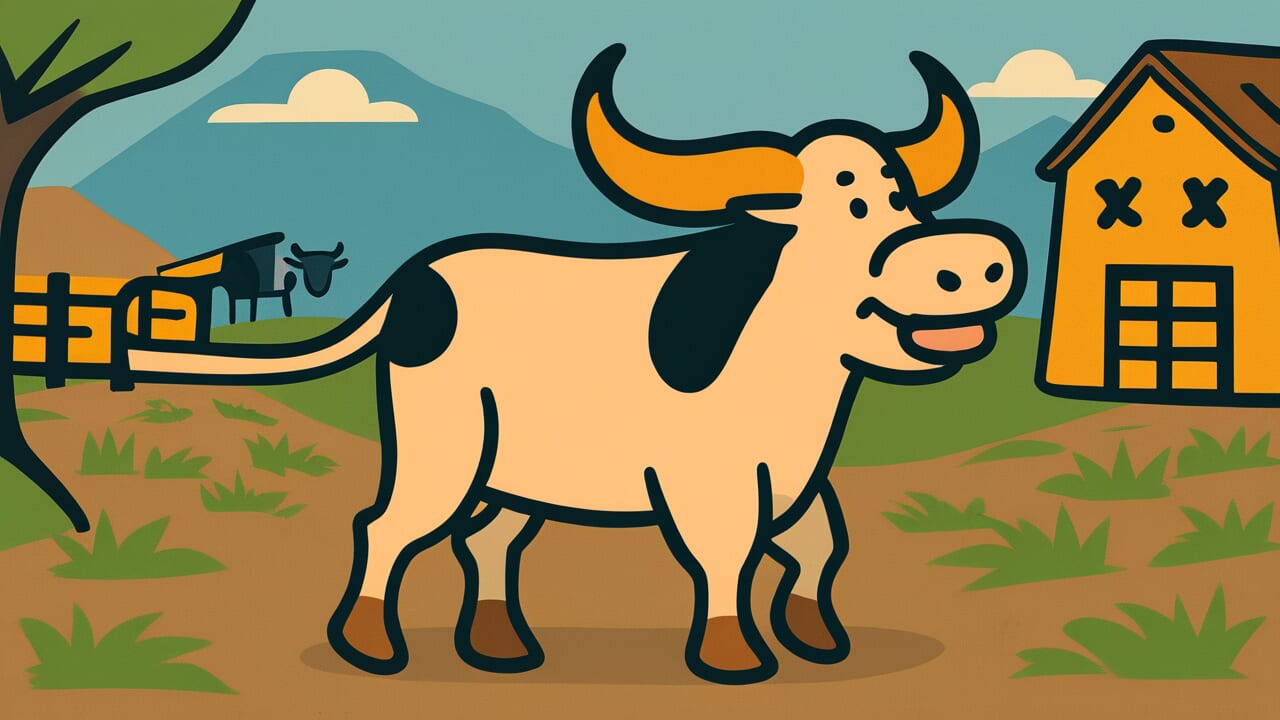How to Read “A bee stings an ox’s horn”
Ushi no tsuno wo hachi ga sasu
Meaning of “A bee stings an ox’s horn”
“A bee stings an ox’s horn” is a proverb that describes how small attacks or criticisms have no effect on a powerful opponent.
Just as a bee’s sting cannot hurt an ox’s hard horn, attacks from a weak position cannot influence someone with overwhelming power.
This proverb teaches that reckless challenges or meaningless resistance end in futility when there is a clear difference in strength.
This saying applies to situations where power differences are obvious. Examples include a small company challenging a large corporation, weak people criticizing those in power, or confronting opponents with superior abilities.
People use this proverb to warn against wasted effort or to help others recognize realistic power differences.
Even in modern society, this proverb still applies. We see it when social media criticism fails to reach large organizations, or when individual voices get absorbed by massive systems.
Origin and Etymology
No clear written records explain the origin of this proverb. However, we can make interesting observations from how the phrase is constructed.
In Japan’s agricultural society, oxen have long symbolized strength. Among all parts of the ox, the horn best represents its power.
Hard, sharp, and sometimes strong enough to injure people, the horn serves as both weapon and armor for the ox.
A bee’s stinger is certainly a weapon that causes pain. But it only works because it pierces soft human skin. The contrast between these two creates the cleverness of this proverb.
An ox’s horn is covered with extremely hard keratin. No matter how desperately a bee tries to sting, its stinger cannot penetrate the hardness.
Even if it did penetrate, the ox would feel nothing. Our ancestors observed this natural fact and applied it to human power relationships.
People who worked closely with oxen in farming could create this vivid metaphor. They expressed a universal truth through familiar animal characteristics.
Small attacks have no effect on large beings. This wisdom shows brilliant observation of nature.
Usage Examples
- I sued a major corporation, but it was like a bee stinging an ox’s horn—they completely ignored me
- Criticizing that politician is just a bee stinging an ox’s horn, so let’s think of a more effective approach
Universal Wisdom
“A bee stings an ox’s horn” has been passed down through generations because power gaps have always existed in human society.
Everyone has the impulse to speak out against injustice and unfairness. From a sense of justice or anger, we sometimes want to stand up to powerful opponents.
But our ancestors also understood the cold reality that such brave actions do not always bring rewards.
This proverb does not simply preach resignation. Rather, it teaches the importance of accurately recognizing power differences.
If a bee knows that stinging an ox’s horn is useless, it will choose a different strategy. It might target softer areas or decide not to fight at all.
Throughout human history, weak people rarely win by directly challenging the strong. However, many examples exist of people changing situations by changing their approach.
This proverb has survived because people learned from experience that wise judgment, not reckless courage, is the wisdom for survival.
Acknowledging power differences is not surrender. It is the first step toward finding more effective methods.
When AI Hears This
An ox’s horn is made of keratin, the same protein as human nails and hair. It is dead tissue with no nerves.
So a bee sting causes no pain. But here’s what’s interesting: even if nerves existed, from a materials engineering perspective, a bee’s stinger is completely powerless against a horn.
Materials mechanics has a concept called stress concentration. When small force hits a hard material, that force spreads widely throughout the surrounding area.
A bee’s stinger tip is only about 0.01 millimeters in diameter. An ox’s horn is a hard keratin mass over 5 centimeters in diameter.
Calculate it out: the stinger’s contact area is less than one twenty-five-millionth of the horn’s cross-section. No matter how hard the bee pushes, its force spreads thinly across the entire horn.
Structural damage equals essentially zero.
This is like trying to pierce an iron plate with a thumbtack. A thumbtack penetrates soft corkboard, but bounces off hard iron.
The same applies to a bee’s stinger. It works on soft skin but physically cannot damage a hard horn.
This proverb captures an engineering truth: if you misjudge the material and structure of your target, your effort becomes completely wasted.
Lessons for Today
This proverb teaches modern people the wisdom of choosing the right opponent and the right way to fight.
Criticizing major corporations or celebrities on social media, standing alone against huge organizations—such actions may show courage. But are you pouring your precious time and energy into places where they have no effect?
The important thing is not to give up. Rather, it is to fight more wisely.
If you cannot win by direct confrontation, look for different approaches. Gather allies, move public opinion, use legal means, or choose to wait for the right time.
In modern society, individual power may seem small. But history proves that small power can create big changes when you choose the right method.
This proverb does not tell you to surrender to helplessness. It tells you to find the place where your power works most effectively.
Use your passion and energy where they can truly make a difference.



Comments